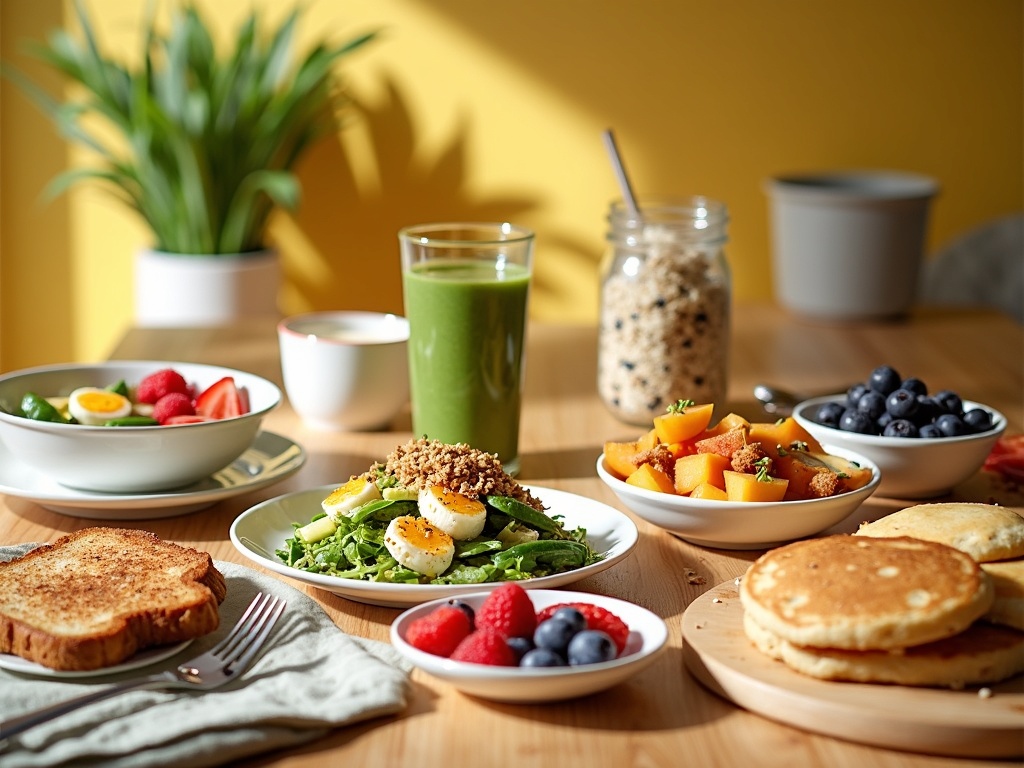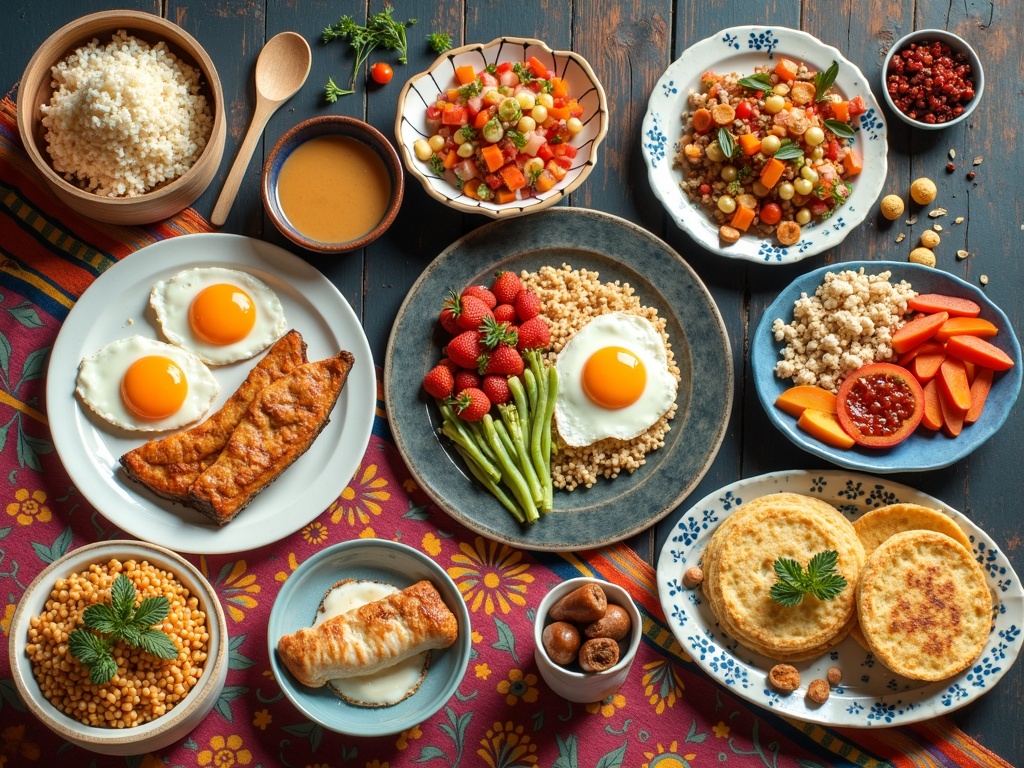Skipping breakfast could harm your health, productivity, and weight management goals despite being a common practice among 20% of adults. Research shows that eating breakfast regularly improves cognitive function, provides essential energy, and helps maintain a healthier weight by starting metabolism and preventing overeating later in the day.
Find In This Article
Key Takeaways
- People who eat breakfast regularly demonstrate better weight management compared to breakfast-skippers, contrary to the misconception that skipping meals aids weight loss.
- Morning meals enhance cognitive performance, with studies showing up to 40% improvement in memory and attention tests among students who eat breakfast.
- Nutritious breakfast options under 300 calories, like oatmeal, eggs, and Greek yogurt, can provide sustained energy without compromising health goals.
- A balanced breakfast should include protein (20-30 grams), complex carbohydrates, and fruits/vegetables for optimal nutrition and sustained energy.
- Global breakfast traditions offer diverse nutritional approaches, with options like Japanese rice and miso soup, English full breakfasts, and Mexican huevos rancheros providing culturally distinct ways to start the day.
Why Skipping Breakfast Could Be Holding You Back
Did you know that 20% of adults regularly skip breakfast? I’ve discovered that missing this important morning meal might be sabotaging your health and productivity goals in ways you haven’t considered.
The Weight Management Connection
Breakfast isn’t just another meal—it’s a critical factor in managing your weight effectively. Studies show that people who skip breakfast are actually more likely to experience weight gain over time, despite the common misconception that skipping meals helps with weight loss. There’s a direct correlation between regular breakfast consumption and healthier weight maintenance.
The science behind this is fascinating. When you skip breakfast, your body’s metabolism doesn’t get the morning jumpstart it needs. This often leads to increased hunger later in the day, potentially causing overeating at lunch or dinner. I’ve seen how this pattern can undermine weight management efforts for many people trying to get healthier.
Energy and Cognitive Benefits
Starting your day with a nutritious breakfast can transform your energy levels. In fact, 50% of survey respondents confirm that breakfast provides them with essential energy for their daily activities. Without this fuel, you might find yourself struggling to concentrate or feeling unusually tired by mid-morning.
The benefits go beyond just physical energy. Research from the American Journal of Clinical Nutrition links breakfast consumption to improved cognitive function. This means better memory, enhanced focus, and sharper thinking throughout your morning. For students and professionals alike, these mental performance benefits can make a significant difference in daily productivity.
Looking for easy breakfast options? Try simple pancake recipes that take just minutes to prepare but provide lasting energy. If you’re tired of traditional options, savory oatmeal offers a delicious twist on a breakfast classic.
For those mornings when you’re really pressed for time, preparing overnight Bircher muesli the night before ensures you’ll never need to skip breakfast again. And if you enjoy international flavors, upma is a flavorful, protein-rich option that keeps hunger at bay until lunch.
The evidence is clear: skipping breakfast could be holding you back from reaching your full potential. Whether your goal is weight management, improved energy, or better cognitive performance, that morning meal plays a crucial role in setting you up for daily success.

Power-Packed Options Under 300 Calories
Starting my day with a nutritious yet calorie-conscious breakfast has transformed my morning routine. I’ve discovered several filling options that pack a nutritional punch without exceeding 300 calories. These choices keep me energized until lunch while supporting my health goals.
Protein and Fiber Champions
Oatmeal stands out as my go-to morning staple at just 150 calories per cup. The high fiber content keeps me satisfied for hours, and I love how versatile it is. I often add cinnamon and a small drizzle of honey for flavor without significantly increasing the calorie count. For a more creative approach, baked oats offer a cake-like texture while maintaining the nutritional benefits of traditional oatmeal.
Large eggs contain approximately 70 calories each and deliver complete protein with all essential amino acids. I prepare them scrambled with vegetables or as a quick omelet for a protein-rich start to my day. The protein helps rebuild muscle tissue and keeps hunger at bay throughout the morning.
Whole grain toast provides about 80 calories per slice while offering substantial fiber and nutrients. I pair it with a tablespoon of almond butter or mashed avocado for healthy fats that enhance nutrient absorption without pushing my breakfast over the calorie limit.
Greek yogurt has become my protein powerhouse with around 20 grams per serving. The plain variety keeps calories lower while still delivering calcium and probiotics for gut health. I customize it with fresh berries or a sprinkle of cinnamon. For a make-ahead option similar to yogurt, Bircher muesli combines oats, yogurt, and fruits in a refreshing morning meal.
Smoothies offer incredible flexibility within the 200-300 calorie range. I create nutrient-dense combinations using spinach, frozen berries, a banana, and unsweetened almond milk. The natural sugars provide quick energy while the fiber keeps blood sugar levels stable. Adding a small scoop of protein powder turns this into a complete meal.
Overnight oats have revolutionized my busy mornings. This fiber-rich alternative requires no morning prep—I simply combine oats with milk or yogurt the night before and let them soak in the refrigerator. By morning, I have a ready-to-eat meal that’s both satisfying and nutritious. The savory oatmeal variation has been a game-changer when I crave something different from the typical sweet breakfast.
For those mornings when I need something quick but still nutritious, I’ve found that a quick pancake recipe using whole grain flour keeps calories in check while still satisfying my breakfast cravings. I top mine with fresh fruit instead of syrup to add natural sweetness.
Cultural breakfast options like upma or ube mochi pancakes offer delicious alternatives that can be adjusted to fit within my 300-calorie goal while introducing exciting flavors and textures to my morning routine.
These power-packed options prove that calorie-conscious breakfasts don’t have to be boring or leave you hungry. By mixing and matching these choices throughout the week, I maintain variety while supporting my health and weight management goals.

Brain Benefits of Early Morning Eating
That first meal of the day does more than just satisfy hunger—it literally powers your brain. I’ve discovered that breakfast serves as premium fuel for cognitive function, setting the stage for mental clarity throughout the day.
Enhanced Learning and Memory
Starting your day with a nutritious breakfast significantly improves cognitive performance, especially in younger populations. Research shows that children and adolescents who eat breakfast regularly demonstrate better problem-solving abilities and enhanced memory retention compared to those who skip it.
Students who fuel up before class process and retain information more effectively. This improved learning capability translates directly to academic performance—multiple studies have linked regular breakfast consumption with higher test scores and better grades. One study found that students who ate breakfast performed up to 40% better on memory and attention tests than those who didn’t.
For a brain-boosting morning meal, try options that combine complex carbohydrates with protein. Baked oats provide slow-release energy while adding ingredients like nuts or seeds contributes essential fatty acids for brain health. Alternatively, upma offers a savory option packed with vegetables and spices that support cognitive function.
Sustained Concentration and Metabolism
The morning hours are often when we need to be most productive, and breakfast plays a key role in maintaining focus. Research demonstrates that those who eat breakfast maintain higher concentration levels throughout the morning compared to breakfast-skippers.
This sustained mental energy stems partly from breakfast’s effect on metabolism. When you eat within an hour of waking, you:
- Jumpstart your metabolic rate, which remains elevated for hours
- Stabilize blood sugar levels, preventing mid-morning energy crashes
- Reduce stress hormone production that can impair thinking
- Support neurotransmitter production necessary for focus
For busy mornings, quick options like simple pancakes or Bircher muesli prepared the night before can ensure you don’t miss out on these brain benefits. Even a savory oatmeal topped with an egg provides protein and choline—nutrients that support memory and brain development.
The cognitive benefits of breakfast are particularly pronounced when the meal includes a balance of nutrients rather than just simple sugars. Including protein, healthy fats, and fiber helps extend the mental performance boost well into the day, preventing the mid-morning slump that many experience after skipping breakfast or choosing sugary options.
Around the World in Breakfast Plates
Starting my day with familiar breakfast foods offers comfort, but exploring global breakfast options has opened my eyes to incredible flavors and traditions. Breakfast varies dramatically across cultures, reflecting local ingredients, traditions, and nutritional priorities.
Cultural Breakfast Traditions Worth Trying
In Japan, traditional breakfasts center around a balanced combination of steamed rice, umami-rich miso soup, and grilled fish. This protein-packed, low-sugar morning meal provides sustained energy without the mid-morning crash many Westerners experience after sugary cereals. Japanese breakfasts often include small portions of pickled vegetables, adding beneficial probiotics to start the day.
The English breakfast takes a heartier approach with eggs, beans, toast, and chicken or beef sausage. This filling combination has fueled generations through cold mornings and physically demanding work. What makes this breakfast special is how each component plays off the others—the runny egg yolk mixing with the savory beans, the crisp toast perfect for sopping up flavors.
Mexican breakfast traditions bring vibrant flavors through dishes like huevos rancheros—fried eggs served on corn tortillas and smothered in salsa. The combination of protein from eggs and complex carbohydrates from corn makes this a nutritionally balanced start. I’ve found that savory oatmeal shares similar nutritional benefits while being adaptable to different flavor profiles.
The diversity in breakfast approaches extends beyond these examples. In India, upma made from semolina provides a savory morning option packed with vegetables and spices. Meanwhile, the Swiss start their day with Bircher muesli, an overnight oat mixture that’s both convenient and nutritious.
People are becoming more adventurous with breakfast choices. Studies show that 36% of people express willingness to try international breakfast options, indicating growing curiosity about global morning meals. This openness has led to fusion creations like ube mochi pancakes, which blend Japanese and Filipino influences for a unique morning treat.
The nutritional profiles of these breakfasts reflect cultural priorities and available ingredients:
- Mediterranean breakfasts feature olive oil, fresh cheese, and whole grains for heart health
- Scandinavian morning meals incorporate fish rich in omega-3 fatty acids and whole-grain rye
- East Asian breakfasts often include fermented foods supporting gut health
- South American options frequently combine fresh fruits with corn-based dishes for energy
Preparation methods vary significantly across cultures too. While Americans might reach for a quick pancake recipe or cereal, many cultures dedicate more time to breakfast preparation. In Morocco, breakfast might include slow-cooked tagines, while Korean families might prepare several small dishes including soup, rice, and pickled vegetables.
The beauty of these diverse breakfast traditions lies in their ability to adapt. I’ve found that incorporating techniques like the slow-cooking approach of baked oats can transform familiar ingredients into something extraordinary.
By exploring breakfast traditions from around the world, I’ve discovered not just new flavors but different approaches to starting the day. Some emphasize protein for sustained energy, others complex carbohydrates, and still others prioritize vegetable intake from the day’s first meal. This global breakfast tour has enriched my morning routine and expanded my culinary horizons beyond what I imagined possible.

What Makes a Balanced Morning Meal
Starting my day with a balanced breakfast has completely transformed my energy levels and focus. Dietary Guidelines consistently recommend combining whole grains, fruits, and proteins to create an optimal morning meal that fuels your body properly.
Essential Components of a Nutritious Breakfast
Protein should be a cornerstone of your breakfast routine. I’ve found that incorporating protein-rich foods helps maintain fullness longer and stabilizes blood sugar levels. Some excellent protein sources include:
- Eggs prepared in various styles (scrambled, boiled, or as an omelet)
- Greek yogurt topped with nuts or seeds
- Lean meats like grilled chicken or turkey
- Plant-based options such as tofu scrambles or legumes
Complex carbohydrates provide sustained energy rather than the quick spike and crash associated with simple sugars. Upma recipe offers a perfect example of a complex carb breakfast that keeps you satisfied. Other great options include whole grain breads, steel-cut or rolled oats, and baked oats prepared with minimal added sugars.
Fresh fruits aren’t just delicious additions—they provide essential vitamins and natural sugars that energize you. I like adding berries to my Bircher muesli or slicing bananas onto whole grain toast. Citrus fruits also make refreshing sides that boost vitamin C intake.
Portion Control and Meal Planning
Getting portion sizes right ensures you’re receiving optimal nutrition without excess calories. I typically aim for:
- 1/4 plate protein (roughly 20-30 grams)
- 1/4 plate complex carbohydrates
- 1/2 plate fruits and vegetables
This balance helps maintain steady energy levels throughout the morning. For busy days, I prepare savory oatmeal options that can be customized with various toppings for different flavor profiles.
If you’re pressed for time but still want a nutritious start, quick pancake recipes using whole grain flours and minimal sugar can be prepared in minutes. For something unique that combines nutrition with exciting flavors, ube mochi pancakes offer a creative twist on traditional breakfast options.
The ideal breakfast varies based on individual needs, activity levels, and health goals. Athletes might require additional protein and carbohydrates, while those managing specific health conditions should adjust macronutrient ratios accordingly.
Sources:
American Journal of Clinical Nutrition
International Food Information Council, 2023 Food and Health Survey
Dietary Guidelines for Americans, 2020-2025
USDA Nutritional Guidelines

